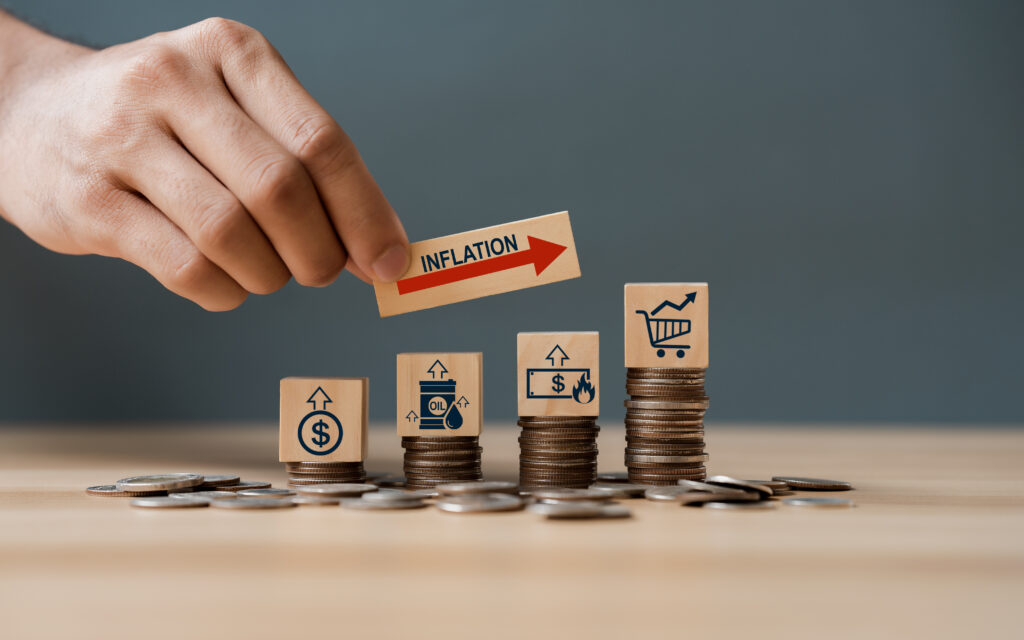So you’re thinking about buying a house? It’s a big decision, and keeping an eye on mortgage rates is important. But what makes those rates go up and down? Inflation is one factor that can affect the housing market.

Let’s break down how inflation and mortgage interest rates are connected and how they can impact your dream of homeownership.
Understanding Inflation
Inflation – ever wonder why things seem to cost a little more each year? That’s inflation! It’s the gradual increase in prices of everyday stuff over time. Imagine you could buy a gallon of milk for USD$3 last year, but now it costs USD$3.20. That’s inflation at work. The more inflation there is, the less you can buy with your money. We use something called the inflation rate to measure how fast prices are going up.

The Link Between Inflation and Interest Rates
Imagine inflation like a hot stove. When prices rise too quickly, it’s like the heat getting turned up. To cool things down, the Federal Reserve, which is kind of like the economy’s thermostat, raises interest rates. Higher mortgage interest rates make borrowing more expensive, so people slow down on spending a bit. This helps keep inflation from getting out of hand.
On the flip side, if prices aren’t rising much, the Federal Reserve might lower interest rates. This makes borrowing cheaper, encouraging people to spend more and get the economy moving faster.
Mortgage Rates Follow the Trend
Think of Georgia mortgage rates like a shadow that follows interest rates set by the Federal Reserve. When those rates go up because of inflation, mortgage rates usually climb, too. This means it costs more each month to pay back your home loan. For example, on a USD$300,000 mortgage with a 30-year fixed rate, a 4% mortgage interest rate might mean a monthly mortgage payment of USD$1,432. But if inflation pushes the rate to 6%, that payment could balloon to USD$1,799. That’s a big difference!
The Ripple Effect on Housing Demand
Higher mortgage rates mean bigger monthly payments to buy a house. This can price out some folks who were hoping to become homeowners. With fewer people able to afford to buy, the demand for houses can cool down.
On the other hand, when mortgage rates are low, it’s cheaper every month to pay back your loan. This can attract more buyers into the market, which can push home prices up.
Protecting Your Purchasing Power
Inflation can mess with your homebuying plans. To lock in your monthly payment amount, you might consider a fixed-rate mortgage. This means your rate stays the same the whole time, no matter what happens with inflation. The downside is the upfront rate might be a bit higher.
Another option is an adjustable-rate mortgage (ARM). This one starts with a fixed rate for a certain number of years, like 5 or 10. But after that period, the rate can adjust up or down. This can be risky if inflation spikes, but it might work well if you plan to sell your house before the rate adjusts.
Timing Your Home Purchase
Thinking about buying a house? Inflation can affect mortgage rates, which can impact how much you pay each month. When there’s high inflation and rates might follow, locking in a mortgage sooner could mean a lower interest rate. But if inflation is expected to go down, waiting might get you a better deal on your loan. Just remember, this is just one thing to consider. Talk to a financial advisor for personalized guidance on your homebuying journey.
Balancing Mortgage Costs and Home Prices
So, what’s the best time to buy? It’s tricky. Inflation can push up mortgage rates, making monthly payments steeper. But it can also inflate home prices, so you’re paying more for the house itself.
On the other hand, lower inflation might mean cheaper monthly payments, but houses could still cost more because more people are looking to buy. It’s a balancing act!
The Long-Term Impact
Let’s say inflation keeps creeping up. Over time, that can actually help you out if you already own a home with a fixed-rate mortgage. Here’s why: your monthly payment stays the same, but as prices go up, the amount you actually owe in today’s dollars shrinks. Think of it like slowly paying off your loan with cheaper dollars!
But remember, inflation isn’t all sunshine and rainbows for homeowners. It can also push up property taxes, insurance, and those never-ending home repair costs.
Seek Professional Guidance
Figuring out how inflation and mortgage rates work together can be a headache, especially for first-time homebuyers. Don’t be afraid to ask for help! Financial advisors, mortgage brokers, and real estate agents can all give you personalized advice based on your situation. They can help you understand what’s going on in the market and figure out the best way to move forward with your homeownership dream.
The Bottom Line
Thinking about buying a house? Inflation and mortgage rates can be confusing, especially for first-timers. But no worries! Financial advisors, mortgage brokers, and real estate agents are there to help. They can explain how things work in your area and guide you towards your dream home.